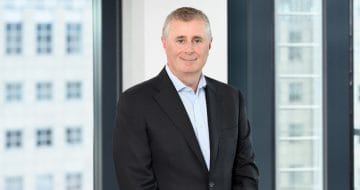Al Watson, Taylor Wessing’s head of UK planning and environment, discusses data centre real estate, early morning starts and how to plan for the future

“I skipped to work years ago, and I skip to work now,” says Al Watson, real estate partner and head of UK planning and environment in Taylor Wessing’s London office. Talking to Watson from the sunny Maltese island of Gozo (he’s enjoying some well-earned down-time), he gives me the insight into his work and his day-to-day at the firm. “I start at half past six in the morning, so I get the first tube into the City at 05.31am. That’s always been my preference because I followed in the footsteps of those I looked up to, and over time it’s become habitual. My client mentor said, ‘if you want to work with me then you come into work early!”
Watson also learned the importance of ‘catching the worm’ in the early hours as a trainee under Ann Minogue, who was the only female Construction Partner in the City at the time. “Ann always started early, so as her trainee, you had to do the same,” he explains. “Now, the early mornings mean that I can get a head-start on billable work and sit down as a team and focus on site visits and meetings with clients outside the office in the afternoons.” He has found, particularly in real estate, that his clients are eager for face time with their solicitors. “It’s a common theme that clients want to see their lawyers in a deal environment, and more importantly they also want to see their advisers when deals aren’t happening,” Watson tells me. “They want to know the market intel; they want to hear your views and thoughts and ideas.” So, working at a high-level in partnership clearly means investing significant time in building client relationships.
Starting his career as a paralegal at McKenna & Co (now CMS), Watson reflects on his initial attraction to real estate, planning and environmental law. “When I was younger, I wanted to become an architect, but I couldn’t — mostly because I can’t draw!” he jokes. “Working in planning means you get to deal with a whole range of experts from architects and engineers to highway consultants. You’re looking collectively at visual impacts, rights of light, massing and design — all these aspects of real estate mean working in a large team. And I love this ‘one team’ aspect,” he says. Similarly, he talks to me about the benefits of working on tangible projects. “With planning as part of real estate work, you can physically see and touch the results,” he says. “In IP, patents, and tax, the law can be incredibly esoteric, but you can’t tangibly feel the outcomes of that work like you can with real estate.”
Illustrating his passion for his specialism, Watson details the economic impacts of real estate and planning work. “In this digital world, there will always be the need for data tomorrow — we will never have less data. At Taylor Wessing, we do a lot of work on data centres; they need water, power and land to operate. So, this digital revolution we’re going through is real estate based,” he explains. And even when it comes to general planning and development across the UK, it can become very political, Watson notes. “Beyond the headline of ‘broken Britain’, one of the main issues is planning reform, which is now being delivered by the new Labour government. This will help to bring about a development boom which the country needs in terms of infrastructure, homes and the digital economy,” he says. “What you plan for now is a clean line of sight into what the economy is going to look like in three, four or five-years’ time.”
I’m also keen to explore another legal aspect of Watson’s role — the environment. I ask him how the UK planning system tries to alleviate the tensions between (over) development and environmental concerns. “It’s a tough question to answer,” Watson acknowledges. “There are many reasons why the UK is fortunate. Namely, we have a moderate climate without extremes. Here in Gozo,” he says, “you see some extreme weather patterns. But we also constrain ourselves in the UK by declaring development restrictions on greenbelt land, AONB land (areas of outstanding natural beauty) and in national parks. This is part of our natural heritage,” he says.
Watson acknowledges that developers must embrace and consider environmental impacts through both the planning and the funding of their projects. With our developer clients we understand that the way to secure planning permission is to mitigate environmental impacts,” he explains. “And banks will provide funding on sustainable development projects because they also need it to fulfil their own ESG reporting standards. . So, this push and pull is important when it comes to mitigating against the effects of climate change. This is a long answer,” he admits, “but the short answer is: it’s very difficult to balance the two.”
Taylor Wessing has temporarily relocated for two years to a location down the hill from its London New Street Square office, with sustainability considerations being front and centre in the firm’s decision to renew the lease for its London headquarters. “The refurbed London office will support our carbon reduction agenda,” says Watson. “This is important to our people and to attract the best talent for the future.”
Talking of talent, I ask Watson why planning and environmental law often flies under the radar for aspiring solicitors looking to make it in the City. “I guess it’s because planning and environmental law does not appear in many law courses at university,” he says. “But then again, law students taking land law soon realise that real estate is very different once they experience the practice.” Students perhaps don’t realise that it’s a hugely varied and interdisciplinary practice area, he tells me. “In the team that I am part of, we are a mix of history, economics, environmental science, as well as business and planning law graduates!” And on why budding lawyers should perhaps consider the practice area, Watson answers, “It is the future. And the future is happening now.”
You can find out more about life at Taylor Wessing at ‘The ESG real estate transition — with Taylor Wessing’, a virtual student event taking place on Monday 23 September. Apply now to attend.
About Legal Cheek Careers posts.


